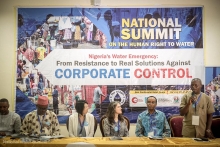Abuja Water Summit Rejects Privatisation Projects

The meeting called on Nigeria’s president and the governor of the state of Lagos to immediately halt all negotiations on privatisation.
In an effort to strengthen accountability and transparency, the meeting also called on Nigeria’s government to immediately publish data relating to funds received for water and sanitation services - as reports show that almost half of the Nigeria population cannot access clean water.
Nigerian trade unions and civil society organisations renewed their commitments to strengthen their alliance to push back against the wrong-handed privatisation policies.
Alternatives to failed privatisation must be implemented in all urgency. These are based on transparency and accountability of all levels of government and the full participation of community members in decision-making.
Experts from around the world provided evidence about the failures of privatisation.
Representatives from Flint and Pittsburgh in the US explained how privatisation had caused the water crises in their communities. Alyson Shaw, an environmental justice campaigner from Pittsburgh, said the crisis had moved the community to force elected officials to back away from water privatisation efforts.
Gina Luster, from Michigan, US, said the water crisis in Flint was a result of the city officials switching their water source “to save $2 million”. She added that the city currently has the highest water rate in the US, ”with people owing up to $1,500 per month.”
Philip Alston, United Nations Special Rapporteur on Extreme Poverty and Human Rights, condemned the World Bank's attempt to sign a deal with the Lagos State government on likely water privatisation. He stressed that the human right to water must be respected.
“Some principles as comfortability, transparency, acceptability and accessibility should be key elements for any decision making to water supply provision. So I call on the governments to ensure they honour the human rights of water and sanitation principles as the key guidance to any decision making in Lagos,” he said.

